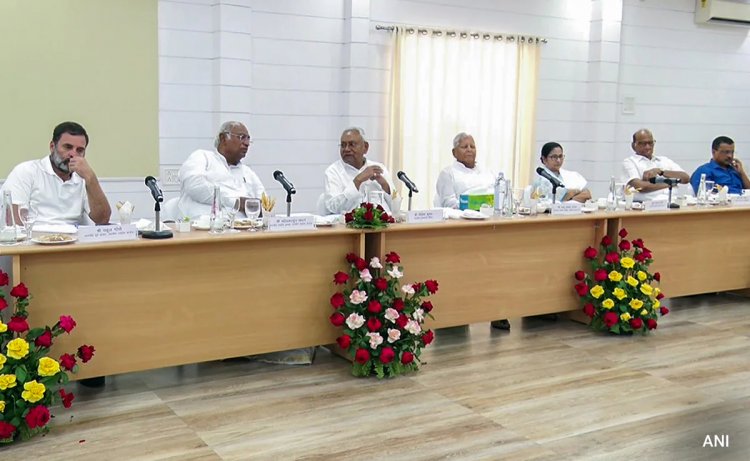Oppostion Unity Moves in Patna
Asia News Agency

The 16 opposition parties which came together in Patna Friday vowed to fight the Bharatiya Janata Party (BJP) unitedly in the 2024 General Election to dislodge the Narendra Modi government.
The leaders of the opposition parties gathered at the official residence of Bihar chief minister Nitish Kumar, who played the host.
Issues between Congress and the Aam Aadmi Party: Meanwhile, the unease between the Congress and the Aam Aadmi Party (AAP) over the contentious Ordinance concerning the administration of Delhi was palpable at the meeting too. Although AAP chief Arvind Kejriwal did attend the meeting, he gave a miss to the press conference addressed by the opposition leaders after the meeting. The AAP insists that Congress must publicly declare its opposition to the Ordinance for AAP to take part in any of the opposition meetings. The Ordinance brought out by the Modi government overrides the Supreme Court order which empowers the Delhi government’s authority over its officers.
Except for the AAP-Congress differences, the leaders of various opposition parties said they are ready to fight together to take on the BJP in the coming General Election. Towards this end, they said that another round of discussion would be held in Shimla around July 11-12 to finalise the way forward for opposition parties. The Congress party will play the host for the upcoming meeting.
‘Collective campaign’
The highlight of the meeting was the coming together of the Trinamool Congress, Samajwadi Party, and Congress. Both TMC and SP have, for long, expressed their reservations over sharing a stage with the Congress party. Both Mamata Banerjee of TMC and Akhilesh Yadav of SP promised to work with other opposition parties in the “spirit of collectivism”.
Banerjee and Yadav are genuinely faced with the dilemma vis-a-vis their relationship with Congress, for they credit their political growth and success to the voter base mainly formed out of the minorities and Dalits, which had, in fact, the core constituency of the Congress during its heydays. In a way, they and the Congress share a common constituency. However, they demand that the Congress should allow them a “free hand” to fight the BJP in their respective regions. The Congress, they say, can focus solely on those states where it is strong and is in a direct contest with the BJP.
Calling for a “collective campaign” against the BJP, Banerjee said, “The Modi government has used central agencies – Central Bureau of Investigation (CBI) and Enforcement Directorate – against their opponents in a partisan manner. It is changing history. We are here to work collectively and protect the history…time to carry out a collective campaign to oust the BJP from power.”
Yadav concurred with Banerjee’s views, expressing his desire to work in a “harmonious unison” with other opposition parties to fight the BJP.
Even before the meeting began, Congress leader Rahul Gandhi had set the tone for discussions. “It’s the battle of ideologies. It’s Bharat Jodo (unite India) versus Bharat Todo (break India). We represent ‘unite India’ and BJP-RSS represents ‘break India’. We can conquer this battle only with love. We will fight collectively to defeat the BJP-RSS,” he said, addressing his party workers, ahead of the meeting.
After the meeting, he did acknowledge that there were “differences” amongst opposition parties, however, he said, “We might have our small differences but we will work collectively to sort them out and fight against the RSS-BJP.”
Opposition parties against a government with a many-layered appeal
This is not the first time that Opposition parties are attempting a joint platform to take on the dominant ruling party. But the anti-BJP alliance that is being put together now, writes The Indian Express “is against a government with a many-layered appeal that has decisively won two terms at the Centre, and posted several electoral successes in the states. It is headed by a leader whose popularity remains high. Today, Opposition parties must deal with the challenges of jointness — seat-sharing, identifying a common leader and a common minimum programme — in a polity that is far more splintered, has sharply defined regional arenas, and therefore many more turf wars. Moreover, the Congress, for long on a downswing, seems to have found new energy within after the ‘Bharat Jodo Yatra’ (Unity March), and new confidence without after the Karnataka victory. That could pose problems for a grouping which includes parties that are claiming the Congress space, or those that are locked in combat with it in the states."
Lingering questions
But there will be lingering questions. “Will the Congress break its reticence on the Central ordinance that seeks to pare down the powers of Delhi’s AAP government? Will non-BJP parties make common cause only on common spectres like central misuse of agencies against political opponents, or will they also say something on national issues like the continuing crisis in Manipur? How much of the grand alliance will be a pre-poll pact, and how much will it leave to post-election configurations?…”
















